人教版英语七年级下册Unit 2 What time do you go to school? 复习课件(共48张PPT)
文档属性
| 名称 | 人教版英语七年级下册Unit 2 What time do you go to school? 复习课件(共48张PPT) |  | |
| 格式 | zip | ||
| 文件大小 | 1.8MB | ||
| 资源类型 | 教案 | ||
| 版本资源 | 人教新目标(Go for it)版 | ||
| 科目 | 英语 | ||
| 更新时间 | 2021-06-21 14:13:16 | ||
图片预览

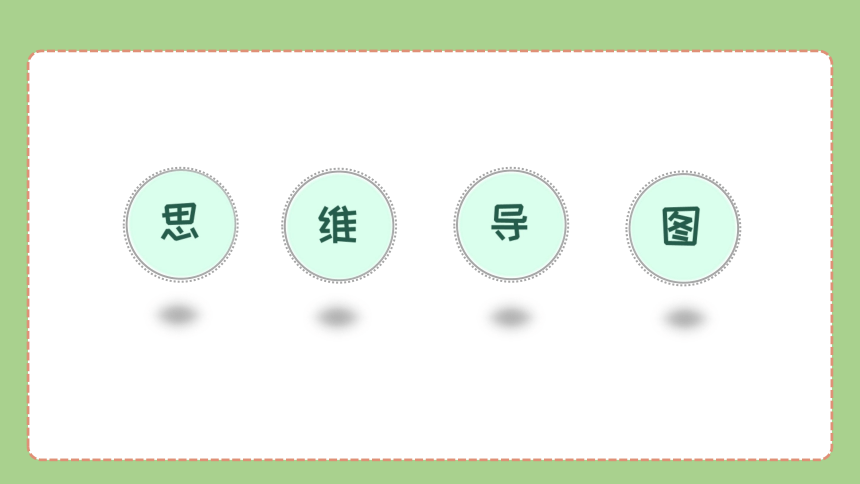
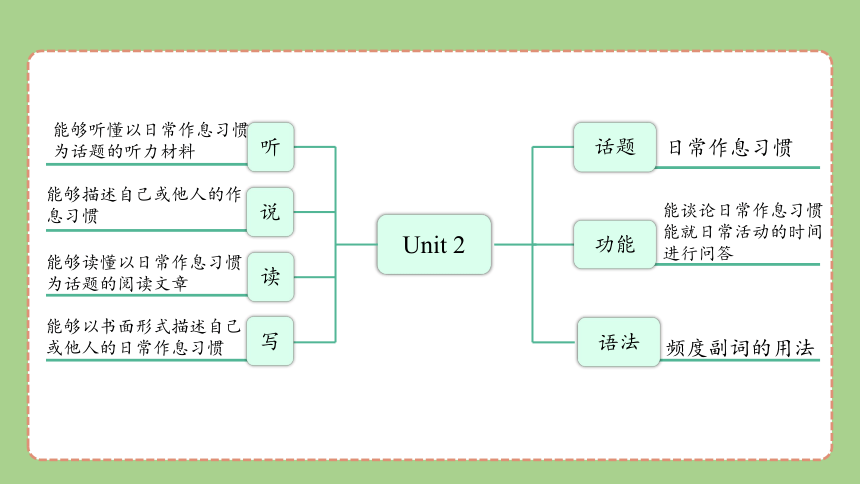
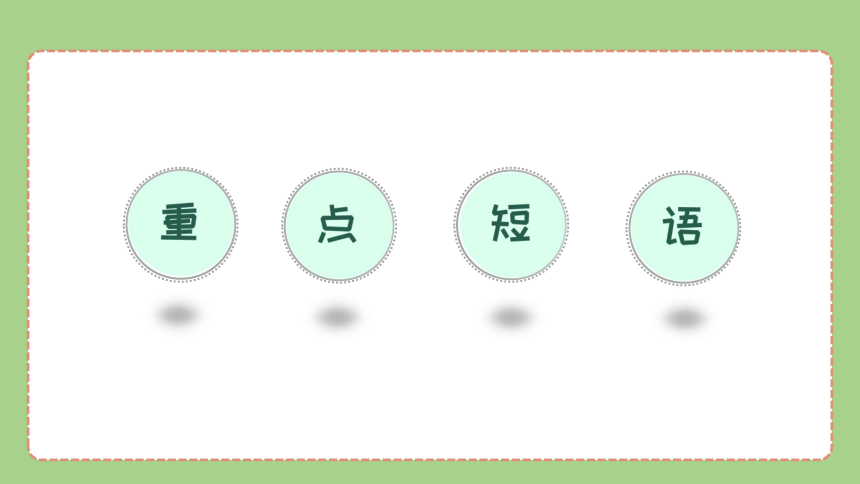
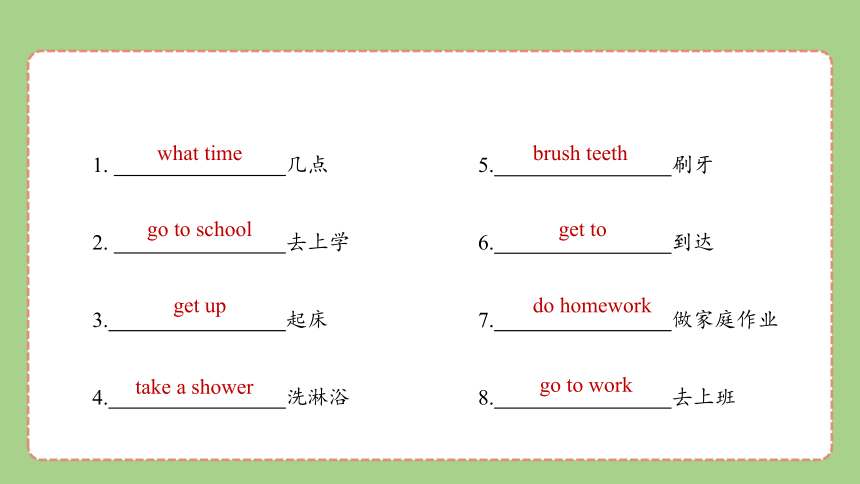
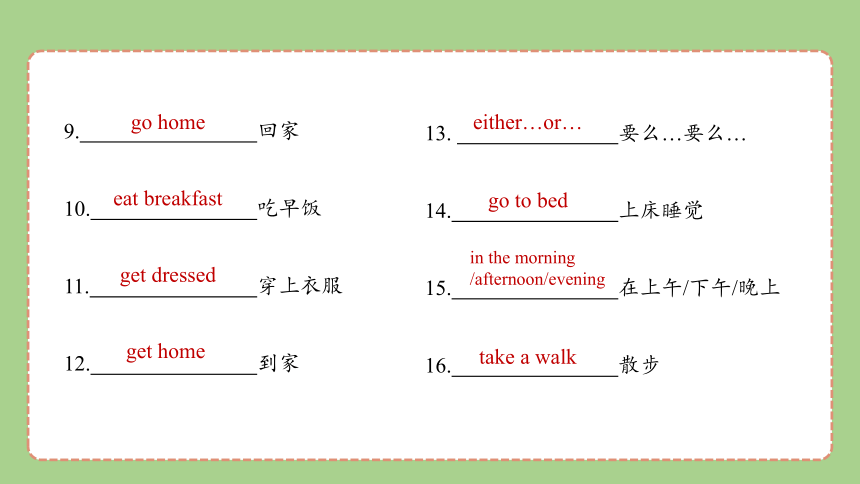
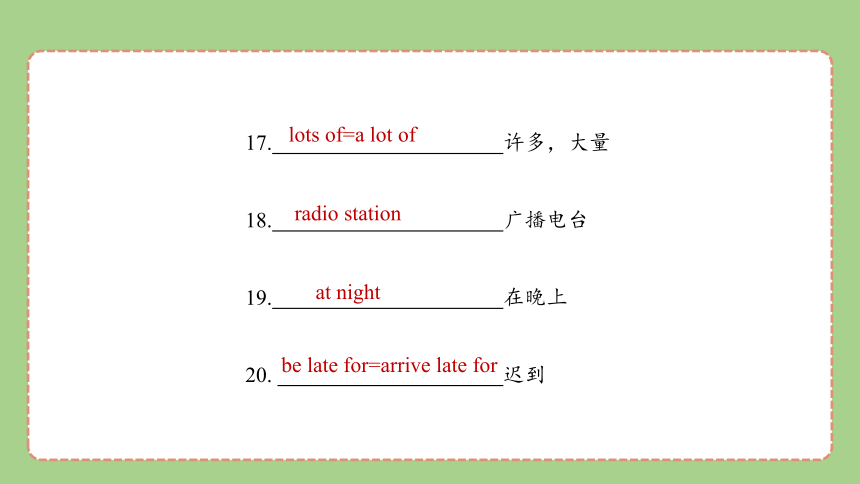
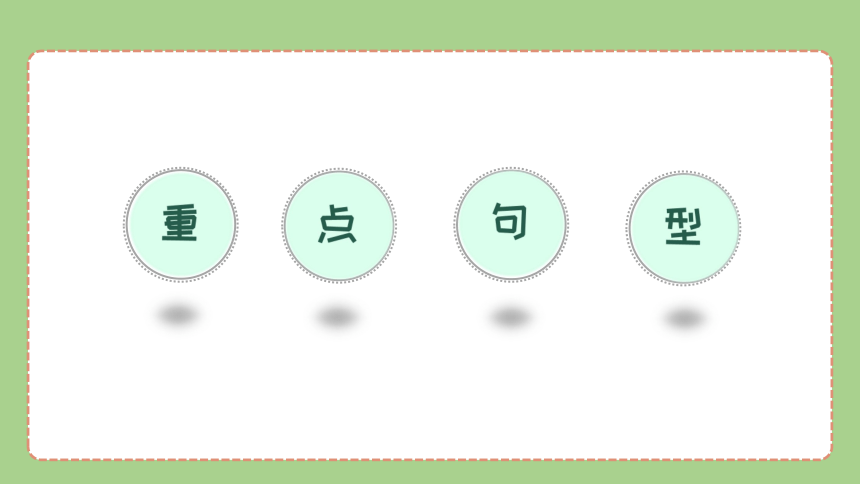
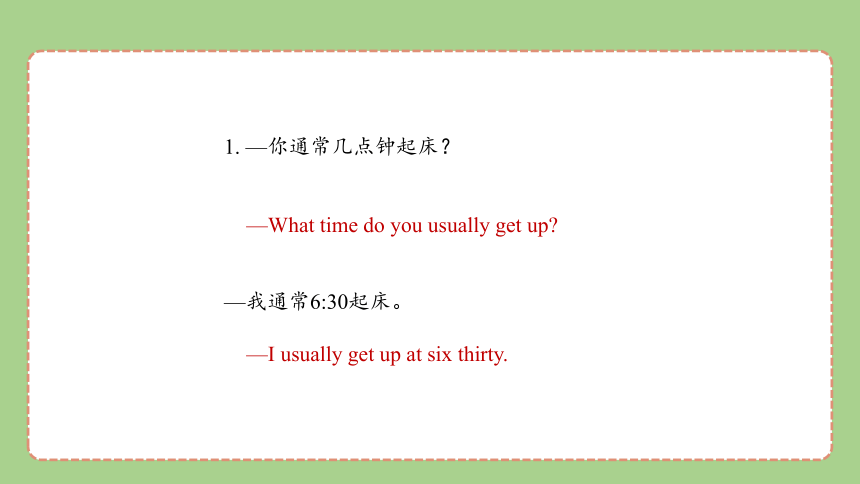
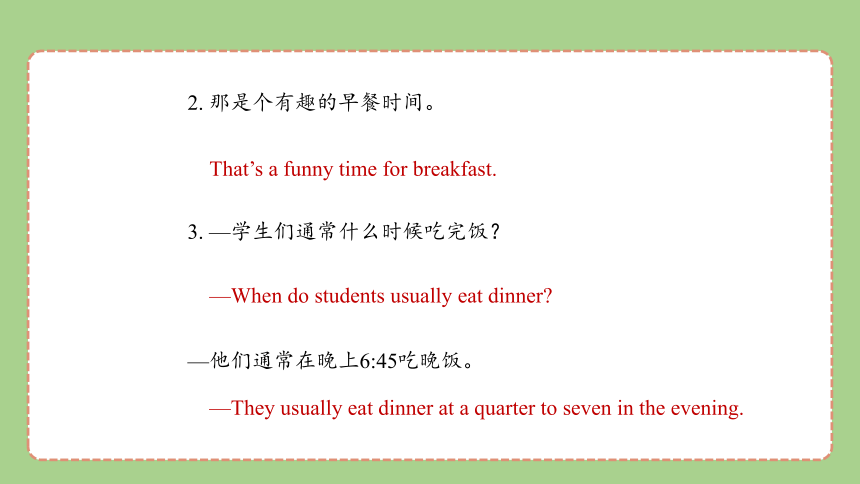


文档简介
(共48张PPT)
Unit
2
What
time
do
you
go
to
school?
复习课
频度副词的用法
能谈论日常作息习惯
能就日常活动的时间进行问答
日常作息习惯
Unit
2
话题
功能
语法
听
说
读
写
能够听懂以日常作息习惯为话题的听力材料
能够描述自己或他人的作息习惯
能够读懂以日常作息习惯为话题的阅读文章
能够以书面形式描述自己或他人的日常作息习惯
1.
几点
2.
去上学
3.
起床
4.
洗淋浴
5.
刷牙
6.
到达
7.
做家庭作业
8.
去上班
what
time
go
to
school
get
up
take
a
shower
brush
teeth
get
to
do
homework
go
to
work
9.
回家
10.
吃早饭
11.
穿上衣服
12.
到家
13.
要么…要么…
14.
上床睡觉
15.
在上午/下午/晚上
16.
散步
go
home
eat
breakfast
get
dressed
get
home
either…or…
go
to
bed
in
the
morning
/afternoon/evening
take
a
walk
17.
许多,大量
18.
广播电台
19.
在晚上
20.
迟到
lots
of=a
lot
of
radio
station
at
night
be
late
for=arrive
late
for
1.
—你通常几点钟起床?
—我通常6:30起床。
—What
time
do
you
usually
get
up?
—I
usually
get
up
at
six
thirty.
2.
那是个有趣的早餐时间。
3.
—学生们通常什么时候吃完饭?
—他们通常在晚上6:45吃晚饭。
That’s
a
funny
time
for
breakfast.
—When
do
students
usually
eat
dinner?
—They
usually
eat
dinner
at
a
quarter
to
seven
in
the
evening.
4.
在晚上,我要么看电视,要么玩电脑游戏。
5.
在十二点,她午餐吃很多水果和蔬菜。
In
the
evening,
I
either
watch
TV
or
play
computer
games.
At
twelve,
she
eats
lots
of
fruit
and
vegetables
for
lunch.
6.
她知道它对她没好处,但是尝起来很好。
7.
这是你的衣服。
She
knows
it’s
not
good
for
her,
but
it
tastes
good.
Here
are
your
clothes.
do
one’s
homework
do
one’s
homework的意思是“做某人的家庭作业”。
短语中的one’s可以用名词所有格或者形容词性物主代词。
e.g.
What
time
do
you
often
do
your
homework?
get
dressed
dressed在本单元是形容词,意为“打扮好的,穿着衣服的”;get在此是连系动词,后接形容词dressed构成系表结构。
get
dressed意为“穿上衣服”。
e.g.
Mary,
can
you
help
your
baby
sister
get
dressed?
After
I
get
dressed,
I
have
breakfast.
dressed
的其他常见用法
1.dress
up,
意为“装扮,乔装打扮”或者“穿上盛装,打扮”。
e.g.
You
needn’t
dress
up
for
the
party.
2.dress
up
as,意为“装扮成……,打扮成……”。
e.g.
The
boy
often
dresses
up
as
a
monkey.
3.well-dressed,意为“
穿着考究的;穿着入时的;着装得体的;衣着讲究的”。
e.g.
a
well-dressed
lady
take
a
shower
1.shower
名词,意为“阵雨,淋浴”;
take
a
shower
意为“洗澡,洗淋浴”,=have
a
shower。
shower前面可以加形容词来修饰。
e.g.
I
take
a
cold
shower
when
I
feel
tired.
2.类似于“take
a
shower=have
a
shower”这样的用法还有:
take
a
look=
have
a
look
看一看
take
a
seat
=
have
a
seat
坐下,入座
take
a
rest
=
have
a
rest
休息一下
work
1.work不及物动词,意为“工作,劳动”,第三人称单数是works;worker是名词,意为“工人”,复数是workers。
e.g.
He
works
very
hard.
There
are
30
workers
in
the
factory.
工厂里有30个工人。
2.work
名词,
意为“工作”,是不可数名词,但表示一份工作可以用“a
piece
of
work”。
常用于以下词组:
out
of
work
失业/下岗
at
work
在上班
after
work
下班后
go
to
work
去上班
in
work
就业
3.work
名词,
意为“著作,作品”,是可数名词,复数为works。
e.g.
She
is
reading
a
new
work
on
history.
funny
1.funny
形容词,
意为“有趣的,可笑的,滑稽的,奇怪的”;意为“有趣”时,相当于“interesting”。
e.g.
What
a
funny
(an
interesting)
story!
2.fun
是funny的名词形式,意为“乐趣,娱乐,嬉戏,有趣的事”。have
fun
doing
sth.
做某事很开心
e.g.
Life
isn’t
all
fun;
it
has
its
bad
moments.
exercise
1.exercise
作动词,意为“运动,锻炼”等时,既可以作及物动词也可以作不及物动词。
e.g.
Every
day
I
exercise
before
I
go
to
sleep.
(不及物动词)
We
should
constantly
exercise
our
muscles.
(及物动词)
2.exercise
作名词,意为“练习,操”等时,是可数名词。意为“锻炼”时,是不可数名词。
e.g.
We
should
do
eye
exercises.
Let's
take
exercise
together.
quarter
1.quarter
作名词时,可以译为“四分之一”或者“一刻钟”。
e.g.
A
quarter
of
the
apples
are
green.
It’s
a
quarter
past
seven.
2.quarter作动词时,可以译为“把…四等分”。
e.g.
We
should
quarter
the
pineapple.
taste
1.taste做行为动词时,既可以是及物动词也可以是不及物动词,意为“吃,品尝,喝”等。
e.g.I
can
taste
something
sour.
(及物动词)
Sometimes
when
you
are
ill,
you
can't
taste
properly.
(不及物动词)
2.taste做连系动词时,后面跟名词或者形容词作表语,构成主系表结构;意为“吃起来,尝起来”。
e.g.
The
soup
tastes
good.
3.taste
还可以作名词,意为“味道,味觉,品味”等。
e.g.
I
like
the
taste
of
wine.
life
life
名词,既可以是可数名词也可以是不可数名词。
作“生活”讲时,是不可数名词;
作“生命”讲时是可数名词,其复数是“lives”。
e.g.
Life
is
like
a
journey.
(不可数)
Three
people
lost
their
lives
in
the
accident.
(可数)
常见的使用life的词组有:
live
a
…
life
过……的日子
lose
one’s
life
丧生
save
one’s
life
救……的命
give
one’s
life
献身
come
(back)
to
life
复活
usually
1.usually是频度副词,意为“通常”,常位于系动词、助动词或情态动词之后,实义动词之前,在句子中作状语;
但有时也可以放在句首修饰整个句子。
e.g.
I
usually
go
to
school
at
seven
o’clock.
2.usually的形容词是usual,意为“通常的,平常的”。
as
usual,意为“像平常一样”。
它的反义词是unusual,意为“罕有的,不同寻常的”。
e.g.
She
goes
to
work
as
usual.
brush
1.brush
作动词,意为“刷,擦”,三单形式是brushes。brush
one’s
teeth
/
shoes
/
hair
刷牙/擦鞋/
梳头。
e.g.
Please
brush
your
shoes.
2.brush
作名词,意为“刷子,画笔,毛笔”,是可数名词,其复数是brushes。
e.g.
I
can
paint
a
picture
with
a
brush.
tooth
tooth
名词,意为“牙齿”,可数名词。其复数形式是teeth。
e.g.
The
dentist
took
out
two
of
my
teeth.
名词变复数(特殊变化):
1.一些名词的复数是不规则变化的。
e.g.
foot
→
feet(脚)
child
→
children(孩子)
man→men
(男人)woman→
women(女人)
mouse
→
mice(老鼠)
2.还有一些名词的单复数是一样的。
e.g.
sheep→sheep(绵羊)
deer→deer(鹿)
Chinese→Chinese(中国人)
Japanese→Japanese(日本人)
名词变复数(特殊变化):
3.
还有些名词是集合名词,本身就是复数的概念,不需要再变复数。
e.g.
cattle
牛
people
人,人们
police
警察
What
time
do
you
usually
get
up?
这是一个用来询问什么时间做某事的常用句型,意思是“你几点起床?”。它的句式是“What+time+助动词do/does+主语+谓语动词原形+其他?”。当主语是三单时用does,其余人称用do。它经常用来询问具体的点钟,。
e.g.
-What
time
does
Rick
eat
breakfast?
-He
eats
breakfast
at
seven
o’clock.
What
time
do
you
usually
get
up?
短语what
time的意思是“几点”,它和when是同义词,都是对时间进行提问,但what
time所问的时间范围比较小,一般用来提问比较精确的时间,回答的时候一般具体到几点。而when所问的时间范围比what
time要大,回答的时候可以用几点钟,也可以是上午或者下午,甚至是哪一天、哪一年。
e.g.
-What
time/When
do
you
usually
get
up?
-I
usually
get
up
at
seven
o’clock.
-When
is
your
birthday?
-It’s
May
10.
What
time
do
you
usually
get
up?
询问时间还可以用句型:
What’s
the
time
now?
=
What
time
is
it
by
your
watch?
=What’s
the
time
by
your
watch?
回答别人询问几点可以用句型:“It+is+时间.”。
e.g.
It’s
six.
I
usually
get
up
at
six
thirty.
这个句型主要用来回答“What
time
/When…”句型的提问。在回答做某事的具体时间时,要注意英语时间的表达法。英语时间的表达法主要有以下几种情况:
1.如果时间在整点可以用“整点数字+o’clock”这种形式表达,有时候可以不用o’clock。
e.g.
It’s
eight
(o’clock)
now.
2.如果是几点几分,分钟不超过半个小时(包括半小时),可以直接用数字表示。
e.g.
6:11→
six
eleven
(6点11分)
I
usually
get
up
at
six
thirty.
也可以用介词past表示,past的前面是分钟,past的后面是钟点数,表示几点过了几分的意思。
e.g.
6:11→
eleven
past
six
(6点11分)
如果是15分钟可以用a
quarter。
e.g.
7:15
→a
quarter
past
seven
(七点一刻)
如果是30分钟可以用half。
e.g.
6:30
→half
past
six
(六点半)
I
usually
get
up
at
six
thirty.
3.如果是几点几分,分钟超过半小时,可以用介词to,to的前面是分钟(是差几分到下一点的分钟数字),to的后面是下一个点的数字。
e.g.
6:58
→two
to
seven
(7点差2分)
6:45→
a
quarter
to
seven
(七点差一刻)
either…or
1.“either…or”
意为“要么……要么;或者……或者……;不是……就是……”,用来连接两个并列的词、短语或者句子。
e.g.
You
can
either
have
tea
or
coffee.
2.“either…or…”连接的两个并列成分作主语时,谓语动词通常与其靠近的主语保持一致,简称为就近一致。
e.g.
Either
he
or
you
are
right.
Either
you
or
he
is
right.
be
good
for
be
good
for意为“对……有好处,对……有益处”,介词for后接名词或代词。其反义词为be
bad
for,意为“对……有害处”。
e.g.
Junk
food
is
not
good
for
our
health.
其他常见的good
的相关词组还有:
1.be
good
at
擅长……
e.g.
She
is
good
at
English.
2.be
good
with
善于……;精明的;与……相处的好
e.g.
He
is
very
good
with
the
children.
3.be
good
to
对……友好
e.g.
My
friend
was
good
to
me
when
I
was
ill.
That’s
a
funny
time
for
breakfast!
“…time
for
sth.
/…time
to
do
sth.
”,
表示“做……的时间”。
e.g.
We
have
no
time
for
exercise.
由time
构成的常见的句式还有:
“It’s
time
for…
/
It’s
time
to
do…
”意为“该做……的时候了”。
e.g.
It’s
time
for
lunch.
“It’s
time
for
sb.
to
do
sth.…”意为“某人该做某事了”。
e.g.
It’s
time
for
us
to
go
home
now.
正确使用一般现在时态描述习惯性的动作或行为;
按照时间顺序依次描述日常的活动
描述自己或他人某一天的日常生活或工作安排
日常作息
单元话题
话题
内容
写作技巧
请根据下面提示以“My
Day”为题写出自己一天的活动。词数不少于50。
提示:in
the
morning,
get
up,
have
breakfast,
go
to
school,
four
classes;
in
the
afternoon,
three
classes,
go
home;
in
the
evening,
have
supper,
do
my
homework,
go
to
bed。
表达自己对这一天的感想和感受
按照时间顺序,有条理地介绍一天的主要活动安排
介绍一天的活动情况
布局谋篇
开篇点题
详细描述
感想感受
I
have
a
busy
day.
I
usually
get
up
at
6:40.
Then
I
have
breakfast
at7:00.
At
7:50
I
go
to
school.
I
have
four
classes
in
the
morning.
In
the
afternoon
I
have
three
classes.
At
4:00
pm,
I
go
home.
Then
in
the
evening,
I
have
supper.
After
supper,
I
do
my
homework.
Then
I
watch
TV.
At
around
9:00
I
go
to
bed.
I
love
sports.
I
often
exercise
after
school.
I
have
a
healthy
life.
My
Day
1.
Usually
I
make
breakfast
for
my
family
____
Saturdays.
A.
at
B.
in
C.
on
D.
to
2.
Tina
____
drives
to
work.
But
today
she
drives
because
of
the
rain.
A.
always
B.
often
C.
sometimes
D.
hardly
3.
Every
year
thousands
of
tourists
____
the
mountain
area
to
relax
themselves.
A.
visited
B.
were
visiting
C.
visit
D.
have
visited
C
D
C
4.
—Can
you
play
volleyball
or
basketball?
—
____
of
them.
I'm
good
at
ball
games.
A.
Both
B.
Either
C.
Neither
D.
None
5.
—Look,
Linda.
The
flowers
in
our
classroom
came
out
in
one
night.
—
I
can't
believe
it.
They
are
beautiful
and
colorful.
They
____
great.
A.
sound
B.
smell
C.
taste
A
B
6.—What
do
you
think
of
the
fish
soup?
—Well,
it
____
a
bit
salty.
A.
looks
B.
smells
C.
tastes
7.You'd
better
leave
____,
or
trouble
will
come
to
you.
A.
lively
B.
friendly
C.
heavily
D.
quickly
8.
—Do
you
want
tea
or
coffee?
—____
is
OK.
I
really
don't
mind.
A.
Neither
B.
Both
C.
Either
9.My
grandparents
wrote
letters
to
keep
in
touch
with
others
____
they
were
young.
A.
when
B.
since
C.
after
D.
before
C
A
C
A
Unit
2
What
time
do
you
go
to
school?
复习课
频度副词的用法
能谈论日常作息习惯
能就日常活动的时间进行问答
日常作息习惯
Unit
2
话题
功能
语法
听
说
读
写
能够听懂以日常作息习惯为话题的听力材料
能够描述自己或他人的作息习惯
能够读懂以日常作息习惯为话题的阅读文章
能够以书面形式描述自己或他人的日常作息习惯
1.
几点
2.
去上学
3.
起床
4.
洗淋浴
5.
刷牙
6.
到达
7.
做家庭作业
8.
去上班
what
time
go
to
school
get
up
take
a
shower
brush
teeth
get
to
do
homework
go
to
work
9.
回家
10.
吃早饭
11.
穿上衣服
12.
到家
13.
要么…要么…
14.
上床睡觉
15.
在上午/下午/晚上
16.
散步
go
home
eat
breakfast
get
dressed
get
home
either…or…
go
to
bed
in
the
morning
/afternoon/evening
take
a
walk
17.
许多,大量
18.
广播电台
19.
在晚上
20.
迟到
lots
of=a
lot
of
radio
station
at
night
be
late
for=arrive
late
for
1.
—你通常几点钟起床?
—我通常6:30起床。
—What
time
do
you
usually
get
up?
—I
usually
get
up
at
six
thirty.
2.
那是个有趣的早餐时间。
3.
—学生们通常什么时候吃完饭?
—他们通常在晚上6:45吃晚饭。
That’s
a
funny
time
for
breakfast.
—When
do
students
usually
eat
dinner?
—They
usually
eat
dinner
at
a
quarter
to
seven
in
the
evening.
4.
在晚上,我要么看电视,要么玩电脑游戏。
5.
在十二点,她午餐吃很多水果和蔬菜。
In
the
evening,
I
either
watch
TV
or
play
computer
games.
At
twelve,
she
eats
lots
of
fruit
and
vegetables
for
lunch.
6.
她知道它对她没好处,但是尝起来很好。
7.
这是你的衣服。
She
knows
it’s
not
good
for
her,
but
it
tastes
good.
Here
are
your
clothes.
do
one’s
homework
do
one’s
homework的意思是“做某人的家庭作业”。
短语中的one’s可以用名词所有格或者形容词性物主代词。
e.g.
What
time
do
you
often
do
your
homework?
get
dressed
dressed在本单元是形容词,意为“打扮好的,穿着衣服的”;get在此是连系动词,后接形容词dressed构成系表结构。
get
dressed意为“穿上衣服”。
e.g.
Mary,
can
you
help
your
baby
sister
get
dressed?
After
I
get
dressed,
I
have
breakfast.
dressed
的其他常见用法
1.dress
up,
意为“装扮,乔装打扮”或者“穿上盛装,打扮”。
e.g.
You
needn’t
dress
up
for
the
party.
2.dress
up
as,意为“装扮成……,打扮成……”。
e.g.
The
boy
often
dresses
up
as
a
monkey.
3.well-dressed,意为“
穿着考究的;穿着入时的;着装得体的;衣着讲究的”。
e.g.
a
well-dressed
lady
take
a
shower
1.shower
名词,意为“阵雨,淋浴”;
take
a
shower
意为“洗澡,洗淋浴”,=have
a
shower。
shower前面可以加形容词来修饰。
e.g.
I
take
a
cold
shower
when
I
feel
tired.
2.类似于“take
a
shower=have
a
shower”这样的用法还有:
take
a
look=
have
a
look
看一看
take
a
seat
=
have
a
seat
坐下,入座
take
a
rest
=
have
a
rest
休息一下
work
1.work不及物动词,意为“工作,劳动”,第三人称单数是works;worker是名词,意为“工人”,复数是workers。
e.g.
He
works
very
hard.
There
are
30
workers
in
the
factory.
工厂里有30个工人。
2.work
名词,
意为“工作”,是不可数名词,但表示一份工作可以用“a
piece
of
work”。
常用于以下词组:
out
of
work
失业/下岗
at
work
在上班
after
work
下班后
go
to
work
去上班
in
work
就业
3.work
名词,
意为“著作,作品”,是可数名词,复数为works。
e.g.
She
is
reading
a
new
work
on
history.
funny
1.funny
形容词,
意为“有趣的,可笑的,滑稽的,奇怪的”;意为“有趣”时,相当于“interesting”。
e.g.
What
a
funny
(an
interesting)
story!
2.fun
是funny的名词形式,意为“乐趣,娱乐,嬉戏,有趣的事”。have
fun
doing
sth.
做某事很开心
e.g.
Life
isn’t
all
fun;
it
has
its
bad
moments.
exercise
1.exercise
作动词,意为“运动,锻炼”等时,既可以作及物动词也可以作不及物动词。
e.g.
Every
day
I
exercise
before
I
go
to
sleep.
(不及物动词)
We
should
constantly
exercise
our
muscles.
(及物动词)
2.exercise
作名词,意为“练习,操”等时,是可数名词。意为“锻炼”时,是不可数名词。
e.g.
We
should
do
eye
exercises.
Let's
take
exercise
together.
quarter
1.quarter
作名词时,可以译为“四分之一”或者“一刻钟”。
e.g.
A
quarter
of
the
apples
are
green.
It’s
a
quarter
past
seven.
2.quarter作动词时,可以译为“把…四等分”。
e.g.
We
should
quarter
the
pineapple.
taste
1.taste做行为动词时,既可以是及物动词也可以是不及物动词,意为“吃,品尝,喝”等。
e.g.I
can
taste
something
sour.
(及物动词)
Sometimes
when
you
are
ill,
you
can't
taste
properly.
(不及物动词)
2.taste做连系动词时,后面跟名词或者形容词作表语,构成主系表结构;意为“吃起来,尝起来”。
e.g.
The
soup
tastes
good.
3.taste
还可以作名词,意为“味道,味觉,品味”等。
e.g.
I
like
the
taste
of
wine.
life
life
名词,既可以是可数名词也可以是不可数名词。
作“生活”讲时,是不可数名词;
作“生命”讲时是可数名词,其复数是“lives”。
e.g.
Life
is
like
a
journey.
(不可数)
Three
people
lost
their
lives
in
the
accident.
(可数)
常见的使用life的词组有:
live
a
…
life
过……的日子
lose
one’s
life
丧生
save
one’s
life
救……的命
give
one’s
life
献身
come
(back)
to
life
复活
usually
1.usually是频度副词,意为“通常”,常位于系动词、助动词或情态动词之后,实义动词之前,在句子中作状语;
但有时也可以放在句首修饰整个句子。
e.g.
I
usually
go
to
school
at
seven
o’clock.
2.usually的形容词是usual,意为“通常的,平常的”。
as
usual,意为“像平常一样”。
它的反义词是unusual,意为“罕有的,不同寻常的”。
e.g.
She
goes
to
work
as
usual.
brush
1.brush
作动词,意为“刷,擦”,三单形式是brushes。brush
one’s
teeth
/
shoes
/
hair
刷牙/擦鞋/
梳头。
e.g.
Please
brush
your
shoes.
2.brush
作名词,意为“刷子,画笔,毛笔”,是可数名词,其复数是brushes。
e.g.
I
can
paint
a
picture
with
a
brush.
tooth
tooth
名词,意为“牙齿”,可数名词。其复数形式是teeth。
e.g.
The
dentist
took
out
two
of
my
teeth.
名词变复数(特殊变化):
1.一些名词的复数是不规则变化的。
e.g.
foot
→
feet(脚)
child
→
children(孩子)
man→men
(男人)woman→
women(女人)
mouse
→
mice(老鼠)
2.还有一些名词的单复数是一样的。
e.g.
sheep→sheep(绵羊)
deer→deer(鹿)
Chinese→Chinese(中国人)
Japanese→Japanese(日本人)
名词变复数(特殊变化):
3.
还有些名词是集合名词,本身就是复数的概念,不需要再变复数。
e.g.
cattle
牛
people
人,人们
police
警察
What
time
do
you
usually
get
up?
这是一个用来询问什么时间做某事的常用句型,意思是“你几点起床?”。它的句式是“What+time+助动词do/does+主语+谓语动词原形+其他?”。当主语是三单时用does,其余人称用do。它经常用来询问具体的点钟,。
e.g.
-What
time
does
Rick
eat
breakfast?
-He
eats
breakfast
at
seven
o’clock.
What
time
do
you
usually
get
up?
短语what
time的意思是“几点”,它和when是同义词,都是对时间进行提问,但what
time所问的时间范围比较小,一般用来提问比较精确的时间,回答的时候一般具体到几点。而when所问的时间范围比what
time要大,回答的时候可以用几点钟,也可以是上午或者下午,甚至是哪一天、哪一年。
e.g.
-What
time/When
do
you
usually
get
up?
-I
usually
get
up
at
seven
o’clock.
-When
is
your
birthday?
-It’s
May
10.
What
time
do
you
usually
get
up?
询问时间还可以用句型:
What’s
the
time
now?
=
What
time
is
it
by
your
watch?
=What’s
the
time
by
your
watch?
回答别人询问几点可以用句型:“It+is+时间.”。
e.g.
It’s
six.
I
usually
get
up
at
six
thirty.
这个句型主要用来回答“What
time
/When…”句型的提问。在回答做某事的具体时间时,要注意英语时间的表达法。英语时间的表达法主要有以下几种情况:
1.如果时间在整点可以用“整点数字+o’clock”这种形式表达,有时候可以不用o’clock。
e.g.
It’s
eight
(o’clock)
now.
2.如果是几点几分,分钟不超过半个小时(包括半小时),可以直接用数字表示。
e.g.
6:11→
six
eleven
(6点11分)
I
usually
get
up
at
six
thirty.
也可以用介词past表示,past的前面是分钟,past的后面是钟点数,表示几点过了几分的意思。
e.g.
6:11→
eleven
past
six
(6点11分)
如果是15分钟可以用a
quarter。
e.g.
7:15
→a
quarter
past
seven
(七点一刻)
如果是30分钟可以用half。
e.g.
6:30
→half
past
six
(六点半)
I
usually
get
up
at
six
thirty.
3.如果是几点几分,分钟超过半小时,可以用介词to,to的前面是分钟(是差几分到下一点的分钟数字),to的后面是下一个点的数字。
e.g.
6:58
→two
to
seven
(7点差2分)
6:45→
a
quarter
to
seven
(七点差一刻)
either…or
1.“either…or”
意为“要么……要么;或者……或者……;不是……就是……”,用来连接两个并列的词、短语或者句子。
e.g.
You
can
either
have
tea
or
coffee.
2.“either…or…”连接的两个并列成分作主语时,谓语动词通常与其靠近的主语保持一致,简称为就近一致。
e.g.
Either
he
or
you
are
right.
Either
you
or
he
is
right.
be
good
for
be
good
for意为“对……有好处,对……有益处”,介词for后接名词或代词。其反义词为be
bad
for,意为“对……有害处”。
e.g.
Junk
food
is
not
good
for
our
health.
其他常见的good
的相关词组还有:
1.be
good
at
擅长……
e.g.
She
is
good
at
English.
2.be
good
with
善于……;精明的;与……相处的好
e.g.
He
is
very
good
with
the
children.
3.be
good
to
对……友好
e.g.
My
friend
was
good
to
me
when
I
was
ill.
That’s
a
funny
time
for
breakfast!
“…time
for
sth.
/…time
to
do
sth.
”,
表示“做……的时间”。
e.g.
We
have
no
time
for
exercise.
由time
构成的常见的句式还有:
“It’s
time
for…
/
It’s
time
to
do…
”意为“该做……的时候了”。
e.g.
It’s
time
for
lunch.
“It’s
time
for
sb.
to
do
sth.…”意为“某人该做某事了”。
e.g.
It’s
time
for
us
to
go
home
now.
正确使用一般现在时态描述习惯性的动作或行为;
按照时间顺序依次描述日常的活动
描述自己或他人某一天的日常生活或工作安排
日常作息
单元话题
话题
内容
写作技巧
请根据下面提示以“My
Day”为题写出自己一天的活动。词数不少于50。
提示:in
the
morning,
get
up,
have
breakfast,
go
to
school,
four
classes;
in
the
afternoon,
three
classes,
go
home;
in
the
evening,
have
supper,
do
my
homework,
go
to
bed。
表达自己对这一天的感想和感受
按照时间顺序,有条理地介绍一天的主要活动安排
介绍一天的活动情况
布局谋篇
开篇点题
详细描述
感想感受
I
have
a
busy
day.
I
usually
get
up
at
6:40.
Then
I
have
breakfast
at7:00.
At
7:50
I
go
to
school.
I
have
four
classes
in
the
morning.
In
the
afternoon
I
have
three
classes.
At
4:00
pm,
I
go
home.
Then
in
the
evening,
I
have
supper.
After
supper,
I
do
my
homework.
Then
I
watch
TV.
At
around
9:00
I
go
to
bed.
I
love
sports.
I
often
exercise
after
school.
I
have
a
healthy
life.
My
Day
1.
Usually
I
make
breakfast
for
my
family
____
Saturdays.
A.
at
B.
in
C.
on
D.
to
2.
Tina
____
drives
to
work.
But
today
she
drives
because
of
the
rain.
A.
always
B.
often
C.
sometimes
D.
hardly
3.
Every
year
thousands
of
tourists
____
the
mountain
area
to
relax
themselves.
A.
visited
B.
were
visiting
C.
visit
D.
have
visited
C
D
C
4.
—Can
you
play
volleyball
or
basketball?
—
____
of
them.
I'm
good
at
ball
games.
A.
Both
B.
Either
C.
Neither
D.
None
5.
—Look,
Linda.
The
flowers
in
our
classroom
came
out
in
one
night.
—
I
can't
believe
it.
They
are
beautiful
and
colorful.
They
____
great.
A.
sound
B.
smell
C.
taste
A
B
6.—What
do
you
think
of
the
fish
soup?
—Well,
it
____
a
bit
salty.
A.
looks
B.
smells
C.
tastes
7.You'd
better
leave
____,
or
trouble
will
come
to
you.
A.
lively
B.
friendly
C.
heavily
D.
quickly
8.
—Do
you
want
tea
or
coffee?
—____
is
OK.
I
really
don't
mind.
A.
Neither
B.
Both
C.
Either
9.My
grandparents
wrote
letters
to
keep
in
touch
with
others
____
they
were
young.
A.
when
B.
since
C.
after
D.
before
C
A
C
A
同课章节目录
- Unit 1 Can you play the guitar?
- Section A
- Section B
- Unit 2 What time do you go to school?
- Section A
- Section B
- Unit 3 How do you get to school?
- Section A
- Section B
- Unit 4 Don't eat in class.
- Section A
- Section B
- Unit 5 Why do you like pandas?
- Section A
- Section B
- Unit 6 I'm watching TV.
- Section A
- Section B
- Review of Units 1-6
- Unit 7 It's raining!
- Section A
- Section B
- Unit 8 Is there a post office near here?
- Section A
- Section B
- Unit 9 What does he look like?
- Section A
- Section B
- Unit 10 I'd like some noodles.
- Section A
- Section B
- Unit 11 How was your school trip?
- Section A
- Section B
- Unit 12 What did you do last weekend?
- Section A
- Section B
